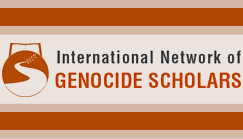
Roundtable 2: The Changing Landscape of Studying Perpetrators in Rwanda
Start Date
3-10-2020 1:00 PM
End Date
3-10-2020 2:30 PM
Loading...
Submission Type
Roundtable
Abstract
The 1994 genocide against the Tutsi in Rwanda was the first genocide since the Holocaust for which researchers interrogated not just the broader trajectories of violence and dealing with this violent past but embraced the micro-level to draw on the insights and perspectives of perpetrators. Rwanda lent itself to this endeavour as over one hundred thousand perpetrators were incarcerated after the genocide, many being tried by the International Criminal Tribunal for Rwanda, national courts, as well as -most importantly- at the community level in gacaca. The sheer amount of people who were indicted and ultimately sentenced gave researchers excellent access to many confessed perpetrators with whom to conduct interviews on all sorts of facets about the genocide, its genesis and aftermath. As such, research on perpetrators in Rwanda was influential in establishing perpetrator studies within research on genocide. Since the beginnings of perpetrator research in Rwanda, however, the political climate in the country has changed, also impacting the way research can be done in the country, as well as the kinds of questions that can be asked. Given the controversial nature of giving voice to perpetrators, this is particularly virulent for researchers seeking to interview perpetrators. Nonetheless, research on perpetrators continues to be conducted today, reacting to thematic developments in perpetrator studies more generally. This roundtable seeks to trace this evolution of perpetrator research in Rwanda from the beginnings in the early 2000s until today. The participants will discuss questions about access for researchers, research ethics in terms of the security for researchers and their Rwandan counterparts as well as for interviewees, what topics have been and may become pertinent and how these can (or cannot) be studied in today’s research landscape.
Roundtable 2: The Changing Landscape of Studying Perpetrators in Rwanda
The 1994 genocide against the Tutsi in Rwanda was the first genocide since the Holocaust for which researchers interrogated not just the broader trajectories of violence and dealing with this violent past but embraced the micro-level to draw on the insights and perspectives of perpetrators. Rwanda lent itself to this endeavour as over one hundred thousand perpetrators were incarcerated after the genocide, many being tried by the International Criminal Tribunal for Rwanda, national courts, as well as -most importantly- at the community level in gacaca. The sheer amount of people who were indicted and ultimately sentenced gave researchers excellent access to many confessed perpetrators with whom to conduct interviews on all sorts of facets about the genocide, its genesis and aftermath. As such, research on perpetrators in Rwanda was influential in establishing perpetrator studies within research on genocide. Since the beginnings of perpetrator research in Rwanda, however, the political climate in the country has changed, also impacting the way research can be done in the country, as well as the kinds of questions that can be asked. Given the controversial nature of giving voice to perpetrators, this is particularly virulent for researchers seeking to interview perpetrators. Nonetheless, research on perpetrators continues to be conducted today, reacting to thematic developments in perpetrator studies more generally. This roundtable seeks to trace this evolution of perpetrator research in Rwanda from the beginnings in the early 2000s until today. The participants will discuss questions about access for researchers, research ethics in terms of the security for researchers and their Rwandan counterparts as well as for interviewees, what topics have been and may become pertinent and how these can (or cannot) be studied in today’s research landscape.



